
Product
Introducing Enhanced Alert Actions and Triage Functionality
Socket now supports four distinct alert actions instead of the previous two, and alert triaging allows users to override the actions taken for all individual alerts.
distributed-dig
Advanced tools
Changelog
[1.1.0] - September 20<sup>th</sup> 2019
--config option to specify an alternative configuration file.--list-defaults option which prints a default config json file to the console; useful as an initial custom configuration file.--timeout & --protocol.Warning logic for ignored domains to remove erroneous warnings with valid switches and options.Readme
npm install -g distributed-digddig [domain [domain] ...] [options]![ddig [domain]](https://marksmurphy.github.io/img/ddig.single.domain.gif)
Issues multiple DNS lookup requests across a multitude of DNS resolvers.
Useful for checking if a DNS record has been fully propagated, or for querying the origins behind an AWS Route 53 / Azure Traffic Manager record (or any other DNS-based load balancing solution).
Installing globally is recommended:
npm install -g distributed-dig
ddig domain [domain [domain] ...] [options]
The following options are available:
--port <number> Specify the DNS port [53]
--protocol <upd|tcp> Specify the DNS protocol [udp]
--timeout <number> Specify the DNS timeout in milliseconds [2500]
--edns <true|false> Enable or disable EDNS(0) [false]
--list-resolvers List resolvers configured in config file
--list-options List DNS request options configured in config file
--verbose Outputs more information
--no-color Switches off colour output
--version Display version number
--help Display this help
Displays the help screen:
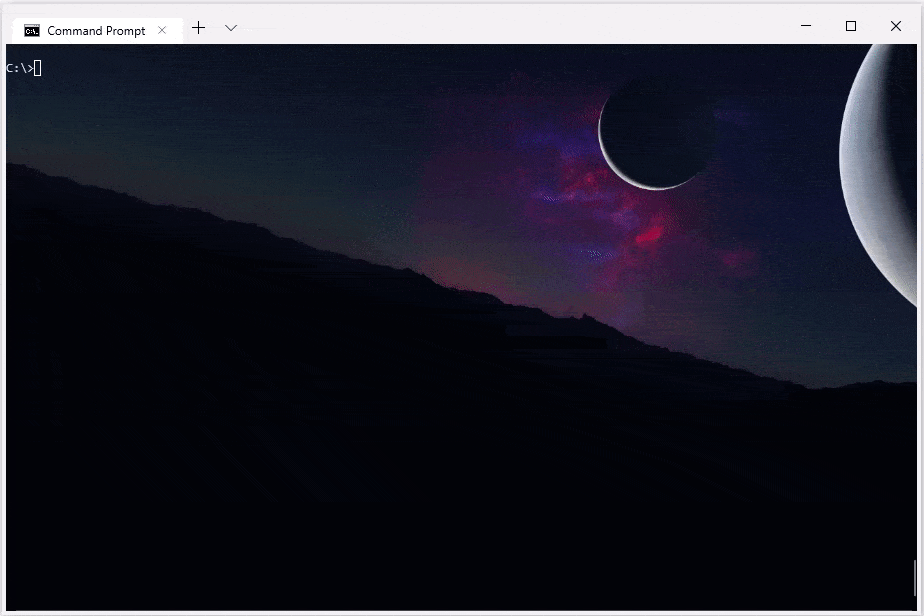
Specify the TCP/UDP port tro use when connecting to the DNS resolver.
Default: 53
Specify whether to use UDP or TCP when connecting to the DNS resolver.
Default: udp
Specifies the timeout in milliseconds to wait for a response from each DNS resolver.
Default: 2500 (2.5 seconds)
Enables EDNS(0)
Default: false (disabled)
With EDNS(0) enabled, if an upstream resolver doesn't support it then the standard DNS will be used as a fallback.
Even though EDNS is support by ~90% of resolvers on the internet 1, it is disabled by default in ddig as it may cause the resolver to return the IP address it considers closest to you, which is counterproductive to the purpose of querying many geographically distributed DNS resolvers.
Lists the resolvers configured in the distributed-dig.json config file:
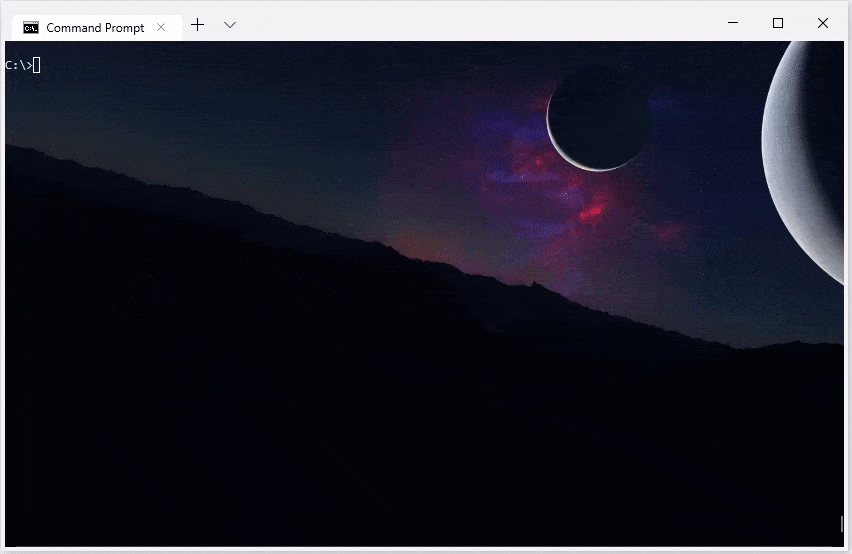
Lists the options configured in the distributed-dig.json config file:
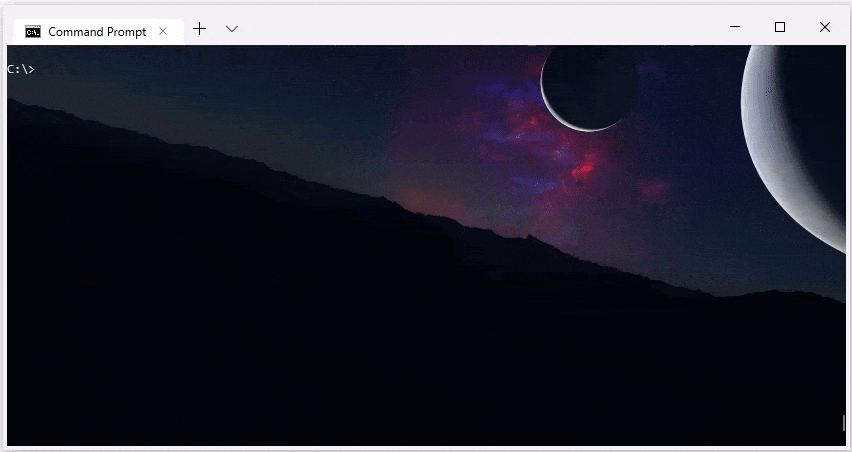
Switches on verbose mode which outputs additional fields:
cname records)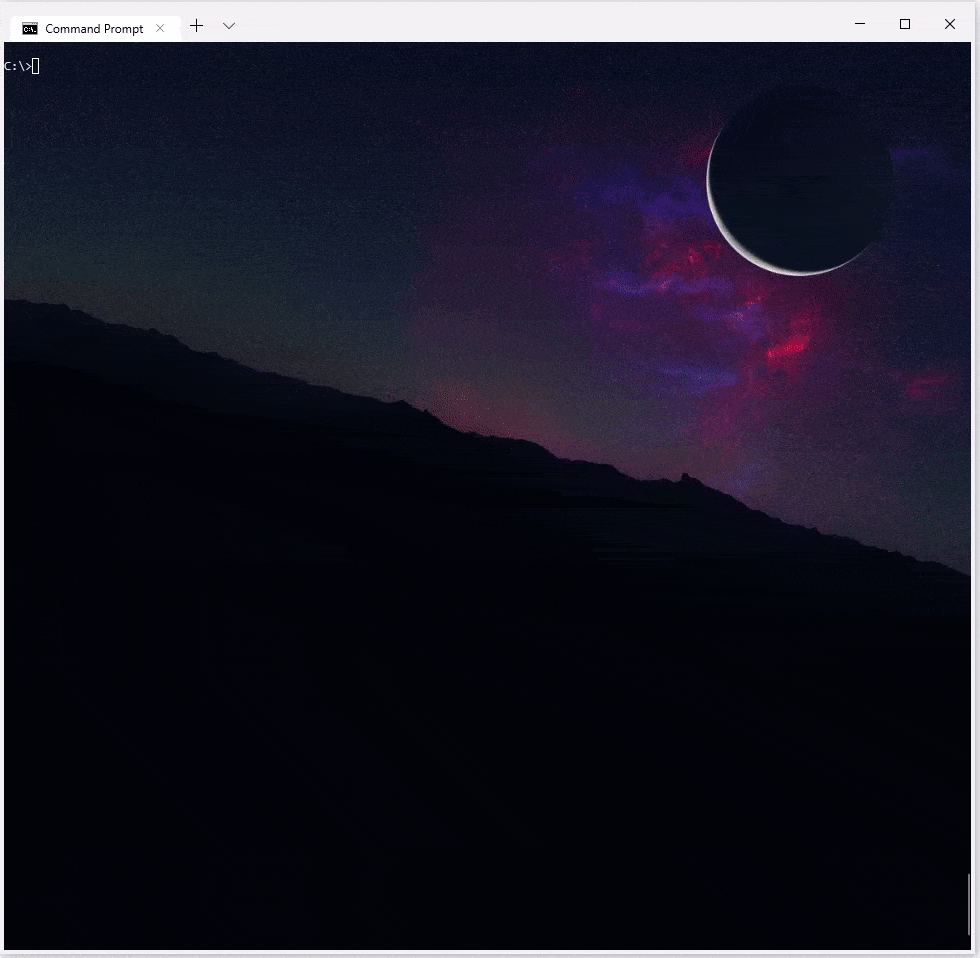
--verbose also modifies the --list-resolvers and --list-options switches.
If your terminal has problems rendering the colour output then you can switch it off by using --no-color
Prints out distributed-dig's version number.
www.asos.com from each of the configured resolver:ddig www.asos.com
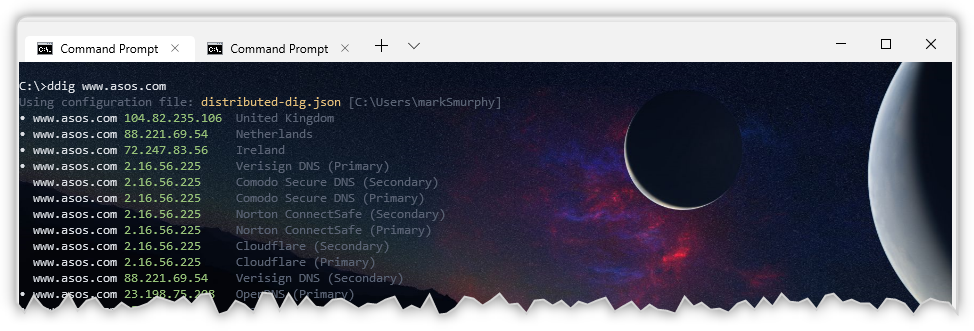
www.asos.com from each of the configured resolver:ddig www.asos.com --verbose
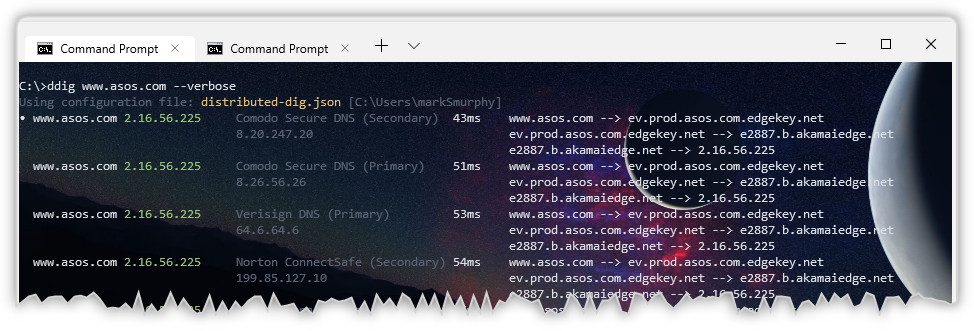
www.asos.com & secure.asos.com from each of the configured resolver with a 5 second timeout:ddig www.asos.com my.asos.com secure.asos.com --timeout 5000
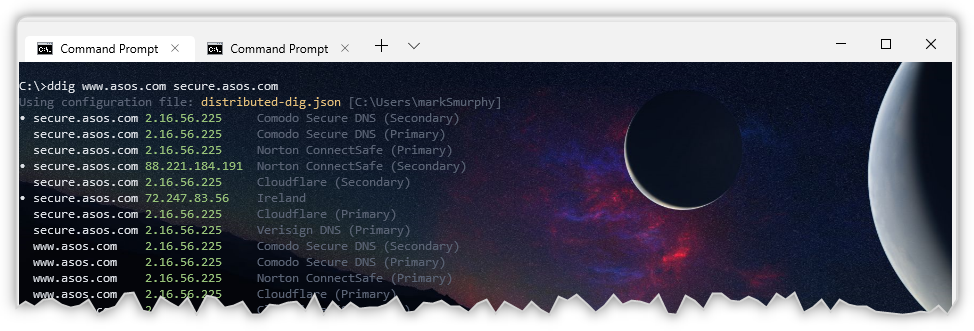
The first occurrence of each unique IP address is marked by a bullet point:
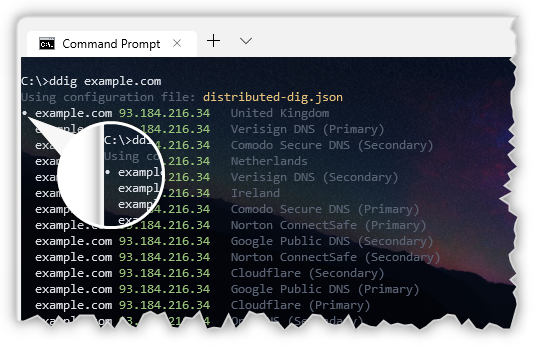
If you use the --verbose switch and have a terminal window that's narrower than 130 columns you'll see a warning:
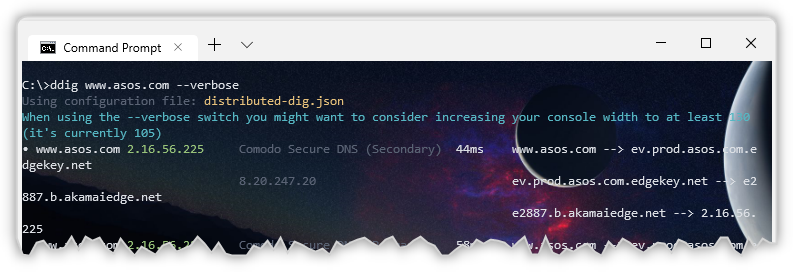
All Options and Resolvers are configured in distributed-dig.json file. This file can exist in any of the following locations:
node -p process.cwd()node -p require('os').homedir()distributed-dig.js)The default options are:
"options": {
"request": {
"port": 53,
"type": "udp",
"timeout": 2500,
"try_edns": false,
"cache": false
},
"question": {
"type": "A"
}
}
Resolvers are configured in an array with each resolver having a nameServer element which should be the IPv4 or IPv6 address, and a provider element which is just a freeform text label:
"resolvers": [
{
"nameServer": "208.67.222.222",
"provider": "OpenDNS (Primary)"
},
{
"nameServer": "208.67.220.220",
"provider": "OpenDNS (Secondary)"
},
{
"nameServer": "217.199.173.113",
"provider": "United Kingdom"
}
]
You can find a list of public DNS servers here and tailor the configured list for your own requirements.
distributed-dig uses the npm package debug. If you set the environment variable debug to ddig you'll see full debug output.
set debug=ddig
DEBUG=ddig
$env:debug="ddig"
Question: What terminal/console are you using in the screen shots?
Answer: A pre-release of Microsoft's new tabbed Windows Terminal which has many excellent features, and the ability to configure a background image.
FAQs
A utility which makes DNS lookup requests across multiple DNS resolvers and collates the results.
The npm package distributed-dig receives a total of 3 weekly downloads. As such, distributed-dig popularity was classified as not popular.
We found that distributed-dig demonstrated a not healthy version release cadence and project activity because the last version was released a year ago. It has 1 open source maintainer collaborating on the project.
Did you know?

Socket for GitHub automatically highlights issues in each pull request and monitors the health of all your open source dependencies. Discover the contents of your packages and block harmful activity before you install or update your dependencies.

Product
Socket now supports four distinct alert actions instead of the previous two, and alert triaging allows users to override the actions taken for all individual alerts.

Security News
Polyfill.io has been serving malware for months via its CDN, after the project's open source maintainer sold the service to a company based in China.

Security News
OpenSSF is warning open source maintainers to stay vigilant against reputation farming on GitHub, where users artificially inflate their status by manipulating interactions on closed issues and PRs.